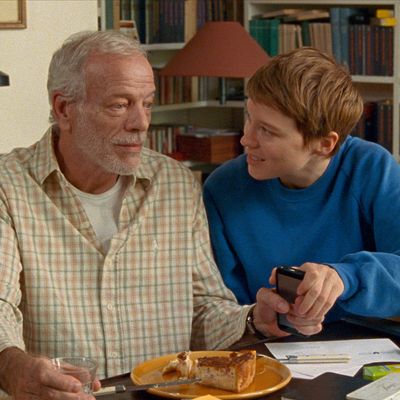
In the real world, the quest for happiness looks less like a journey and more like a series of blind, awkward fumbles. Mia Hansen-Løve is perhaps the contemporary filmmaker whose work comes closest to approximating that real-life pursuit onscreen. She makes pictures that amble along with the rhythms of the everyday, and when her characters experience brief moments of contentment, they don’t quite know what to do with themselves. It should come as no surprise, then, that her movies tend to be semi-autobiographical; she borrows odds and ends from her own life (and the lives of those around her), and reconfigures them into stories that carry the unnerving echoes of truth.
In One Fine Morning, Léa Seydoux plays Sandra Kienzler, a widowed single mother whose father, Georg (Pascal Greggory), a renowned philosophy professor, has been struggling with a form of dementia known as Benson’s syndrome, which affects one’s visual perception. (Hansen-Løve’s late father, Ole, was also a philosophy professor who suffered from the same malady.) While Sandra and her family (including her vivacious, eco-activist mom, played by Nicole Garcia) mull what to do with Georg’s rapidly deteriorating condition, Sandra reconnects with an old friend, Clément (Melvil Poupaud), a cosmo-chemist whose son is about the same age as her daughter. Though Clément is married, the two soon begin a heated affair, and suddenly, Sandra, who has spent so much of her time caring for others, finds herself deeply in need of this man’s affections.
This could have easily become a torrid, tear-jerking melodrama, but Hansen-Løve’s matter-of-fact approach to performance and incident allow the emotions to emerge organically from the unfussy drama onscreen. Clément is troubled over the fact that he’s married and yet is clearly falling in love with Sandra. For her part, Sandra had thought of her love life as being behind her, and now seems to struggle with the idea of being selfish with her desires. The film doesn’t judge its characters. Hansen-Løve is not interested in moral visions or tidy messages or modeling appropriate behavior. She perhaps understands that the world does not operate in such ways. This extends not just to matters of the heart but to the quotidian cruelties sometimes required to survive the day. The film’s most quietly devastating scene comes when Sandra, on her way out of her father’s nursing home after a visit, sees him wandering the halls, lost like many of the other elderly residents there; even though it breaks her heart, she simply gets in the elevator and leaves. (It’s fun sometimes to think about how Hollywood might try to remake a movie like this, and by fun I actually mean mortifying.)
A translator, Sandra flits from location to location, event to event, stuck in a routine-less routine. She’s a busy woman, and One Fine Morning moves at the pace of her life, brisk and methodical. Seydoux is constantly in motion, and the camera generally captures her in profile, as if she might be avoiding direct close-ups or instances of genuine clarity. So that when Sandra does slow down when she’s with Clément, the intimacy can be bracing: We understand that this woman has been holding back a whole universe of feelings, which we only see in brief, tender flashes. The danger of irreparable sadness haunts Seydoux’s performance.
Hansen-Løve nevertheless reminds us that beauty can be found even in the mundane cadences of ordinary life. The legendary Swedish folk-jazz pianist Jan Johansson’s lilting music plays over glimpses of Sandra at work and with her daughter, bringing a measured romanticism to unremarkable moments — as if to remind us that these will one day become cherished memories, precisely the kind of memories that Sandra’s father, Georg, is in the process of losing. At one point, we’re told that One Fine Morning was the title of the memoir that Georg intended to write about his own childhood and his father’s suicide. As a result, the precise meaning of the phrase hangs over the film like a question mark: Is it a reference to what the characters once had, or a warning about what’s to come? Is there any real difference? In the end, it all speaks to our mortality, and to the fleeting nature of happiness. The quest never ends. And then, one day, it does.
More Movie Reviews
- The Thriller Drop Is a Perfect Addition to the Bad-First-Date Canon
- The Accountant 2 Can Not Be Taken Seriously
- Another Simple Favor Is So Fun, Until It Gets So Dumb


